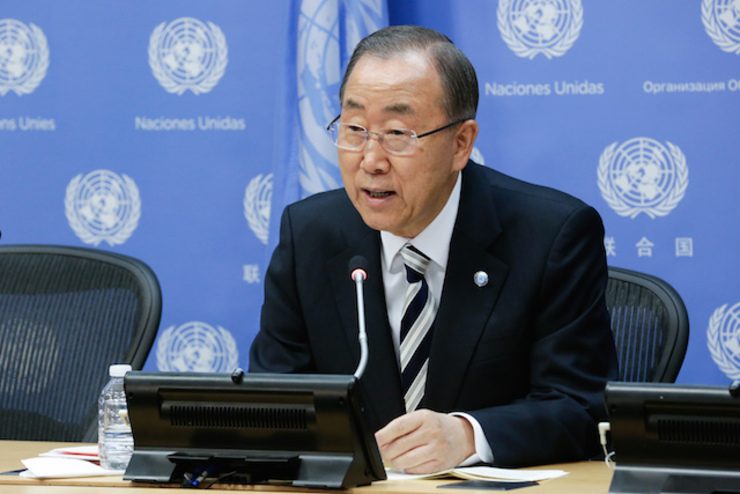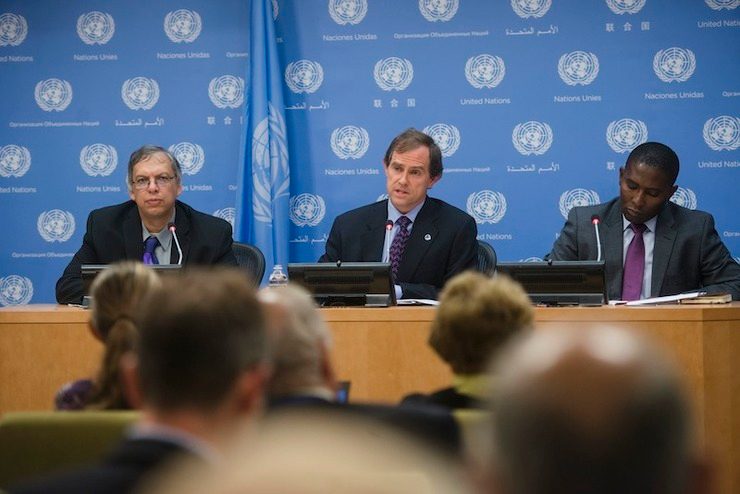SUMMARY
This is AI generated summarization, which may have errors. For context, always refer to the full article.

UNITED NATIONS – The United Nations is set to host what it calls the biggest gathering of world leaders on climate change – but will this make a dent on deadlocked negotiations?
UN Secretary-General Ban Ki-Moon hailed the attendance of 120 heads of state and government at the UN Climate Summit 2014, which opens September 23 at the UN Headquarters in New York.
In comparison, the head of the world body said the previous high-level conference on climate change in Copenhagen, Denmark 5 years ago was only able to gather less than 100 leaders.
“It’s extremely difficult to have on one day, at one time, in one place, 120 heads of state and government. That means there is a very strong commitment on the part of leaders on climate change and other crises we are experiencing,” Ban said in a press briefing a week before the summit on Tuesday, September 16.
The Secretary-General said he expects leaders from government, business and civil society to announce commitments in key areas like energy, cities, industry, transportation and forestry to reduce greenhouse gas emissions and meet the benchmark to keep global temperature rise to two degrees Celsius.
Ban added that the summit will tackle issues that developing nations like the Philippines have been lobbying for – climate finance and technology transfer. He said he will try to ensure funding for the Green Climate Fund (GCF), a $100 billion financing mechanism aimed at helping developing countries in adaptation and mitigation.
The Philippines’ Jose Salceda, governor of the province of Albay, is the co-chair of the GCF. He will attend the summit along with President Benigno Aquino III. Manila is on the front lines of climate change, being the third most disaster prone country in the world, according to the World Disasters Report 2012.
“I expect that many countries’ leaders will announce their bold and ambitious target with some financial support. We have already confirmed the financial support, but I’m also in the process of speaking and urging world leaders to come with a strong support on this financial support and technology support,” Ban said.
Also on the agenda is carbon pricing, which discourages polluters from increasing greenhouse gases by charging them for emissions.
The UN chief said he regrets the absence of Chinese President Xi Jinping and Indian Prime Minister Narendra Modi, who lead two of the world’s top emitters. Still, Ban said Beijing will send Deputy Prime Minister Zhang Gaoli, calling him “the number 3 in terms of hierarchy, a very senior person.”
‘No enforcement mechanism’
Ban and his team emphasized that the summit is not part of the UN Framework Convention on Climate Change (UNFCCC) process, the venue for formal negotiations for a legally binding treaty to be adopted in Paris in 2015.
Robert Orr, UN Assistant Secretary-General for Policy Coordination and Strategic Planning, admitted that there will be no enforcement mechanism to follow up the commitments world leaders announce in the summit.
“The outcome will be the summary of the Secretary-General during the day. It is up to negotiators to bring to their negotiations the outcome of the summit. [But] once leaders have spoken, it’s easier to bring that to the process so we hope political roadblocks will change for the better,” Orr said in a separate briefing.
Lucille Sering, Philippine Climate Change Commissioner, told Rappler that the UN must learn from the Copenhagen talks, considered a failure “after it became more of a political deal than a negotiated one.” Sering said that the Copenhagen Accord failed to recognize the need of middle class developing nations like the Philippines, especially in adaptation. (Read: #COP19: Negotiating on who is to live and who is to die?)
This time around, Orr said what makes the UN summit different from Copenhagen is it not “purely a government affair.”
Among those attending the summit are oil and gas companies, along with agriculture, land use and forestry stakeholders – key sectors in the climate problem.
“The approach we took with this summit is everyone who is part of the problem needs to be part of the solution,” Orr said. You will see key representatives of agriculture, oil, transportation, consumer goods, industries that have taken stock of their part of the climate equation and what they can do today and tomorrow to address it.”

The UN official said hundreds of business leaders will be present from companies as diverse as Asia Pulp and Paper Group, Bank of America, Cargill, GDF SUEZ, Golden Agri-Resources Ltd, Ingersoll-Rand plc, KfW Bankengruppe, McDonald”s Corporation, Saudi Aramco, Unilever, Walmart, Yes Bank Limited, APG and Credit Agricole.
“This is a massive competition. The race for new investments in energy is huge, by companies, by countries. The best way to accelerate the pace [of solving climate change] is competition,” Orr added.
Indonesia to focus on forests
Minister Heru Prasetyo, head of Indonesian National REDD+ Agency, gave Rappler a preview of the speech of Indonesian President Susilo Bambang Yudhoyono at the summit.
REDD stands for Reducing Emissions from Deforestation and Forest Degradation. REDD+ includes the role of conservation and the sustainable management of forest in the effort.
“In Indonesia, our driver for sustainable growth with equity is REDD. We say that because the emissions in Indonesia, 63% of our total emission comes from this sector and we are trying to reduce, 88% of that reduction should come from that sector.”
Prasetyo said that Southeast Asian countries must improve the productivity of agriculture to reduce the strain on forests.
“Southeast Asia is archipelagic and has a lot of coastlines. Climate change is something that is impacting us archipelagic countries in more ways than landlocked countries,” said the minister.
“The UNFCCC has gone through this process for 20 years. It needs some boost, some new spirit, some new interest to make this a real goal. That’s why the climate summit is very important,” he said. – Rappler.com
Rappler multimedia reporter Ayee Macaraig is a 2014 fellow of the Dag Hammarskjöld Fund for Journalists. She is in New York to cover the UN General Assembly, foreign policy, diplomacy, and world events.
Add a comment
How does this make you feel?
There are no comments yet. Add your comment to start the conversation.